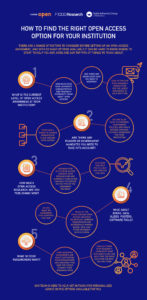Choose open access
Partnering with Taylor & Francis to open up your researchers’ articles and books
Open access (OA) makes published research freely and permanently available online, so anyone can read and build upon it.
Quick links
Korean | Traditional Chinese | Japanese | Bahasa Indonesia | Thai
Supporting your institution’s mission through open access
There are numerous benefits of open access publishing for researchers and for society. Many of these will also help to achieve the objectives of your own institution, including:
Advancing knowledge
Ensuring researchers get credit for their work
Providing learning opportunities for all
Supporting the real-world impact of research
These benefits are why universities and research organizations are investing more resources to help their researchers publish open access. If it’s also one of your priorities, then we’d love to work with you.
Open access choices for institutions
Taylor & Francis Group is committed to working collaboratively and creatively with institutions and partners to drive a sustainable shift towards open research.
We recognize that every institution is at a different stage of their open access journey, so we’ve developed a range of OA options. Each one can be adapted to suit the priorities of your organization. These include:
Journal memberships, book memberships and transformative agreements, to cover your faculty’s book and article publishing charges
F1000 Gateways, Collections, and Platforms, to showcase the cutting-edge research of your institution
The Research Dashboard, which gives you detailed insights into new publications and simplifies the administration of gold and green OA
Find out below how you can partner with Taylor & Francis to support open access publishing at your institution.
Open access choices for researchers
Librarians are often a researcher’s first port of call when they want to know about the different publishing options available to them.
We have a range of choices for researchers to make their journal articles, books, and book chapters open access, including:
Open access journal options, including hybrid and full OA journals
Open access platforms powered by F1000
Find out how authors can choose OA with Taylor & Francis.
In addition, Taylor & Francis offers a growing range of open research initiatives to support and encourage researchers to make the outputs of their work open.
Open access agreements for your institution
Taylor & Francis partners with institutions and funders around the world to help researchers publish gold open access in their chosen journals. These open access publishing agreements allow researchers to benefit from discounted article publishing charges or to publish open access at no cost to themselves.
The needs of institutions vary, so there is no single solution to achieving your open access goals. Our team can work with you to find the right choice for you. This may include:
Transformative agreements
Sometimes known as ‘read & publish’, a transformative agreement is where an increasing proportion of your library spend supports open access publishing services. All whilst enabling your users to continue to read subscription content.
F1000 Collections, Gateways, and Platforms
Find out about the range of tailored open access publishing solutions offered by F1000 for all types of research output from your institution.
Choosing an OA agreement
Read our top tips to help you choose the right OA agreement for your institution.

Our current open access agreements
We have open access publishing agreements with institutions, funders, and consortia around the world. View the current list of agreements.
If you’re a consortia member institution and would like to join an existing agreement, please get in touch by filling out the form above, to find out how.
Resources to support your open access agreement
If your institution already has an OA agreement with Taylor & Francis, we offer a range of resources to help you get the most out of our partnership.
These include:
Research Dashboard user guides
Materials to promote the agreement at your institution
Publishing guidance to share with researchers